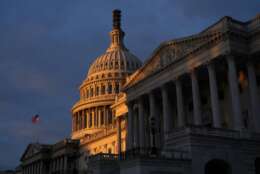government shutdown
-
Preparations for a government shutdown are underway, so if Congress does wind up making a deal and keeps the government open, agencies have spent a lot of time and money for no reason. Chris Cummiskey was deputy under secretary for management and acting deputy under secretary for management at the Homeland Security Department. He's now CEO at Cummiskey Strategic Solutions. He tells In Depth with Francis Rose about the real costs of a government shutdown.
September 22, 2015 -
Rumors of a potential government shutdown are growing louder. Members of industry who have been through it before have some advice on what contractors can do to prepare for a potential shutdown.
September 22, 2015 -
“Shutdown” is too coarse a word for what happens during a funding lapse. The government acts more as a patchwork. For employees, the challenge is knowing who will also be on the job.
September 21, 2015 Gen. Herbert Carlisle says his troops are burnt out and his resources can barely cover the global demand. Carlisle becomes the third senior DoD official this week to highlight the need for Congress to pass a budget and not allow cuts from sequestration to return.
September 18, 2015-
AFGE reminds Congress, White House and others of the concerns feds had during the last government shutdown and the impact the work stoppage had on them and their families in 2013.
September 18, 2015 A top DoD budget official said if Congress does not pass a new budget for 2016, the Pentagon would not have enough money to upgrade systems and platforms for a second straight year.
September 17, 2015-
Reps. Chris Van Hollen (D-Md.) and Nita Lowey (D-NY) said there have been few bipartisan negotiations so far, and a new budget proposal from the Republican Study Committee has them particularly worried. Congress has until Sept. 30 to pass some sort of budget resolution that would keep the government open past the end of the month.
September 17, 2015 -
Secretary John McHugh said an impending budget showdown coupled with a reduction in forces could have a serious impact on the Army's readiness.
September 15, 2015 -
Tomorrow at midnight the month of September will be half over. That means only 15 calendar days until government funding runs out. David Hawkings, the senior editor of CQ Roll Call, is watching how Congress is getting closer to doing a deal and getting farther away at the same time. He shared his insight on In Depth with Francis Rose.
September 14, 2015 -
Political pundits are betting Congress will pass a continuing resolution to keep the government funded past the end of this month. Most agencies would prefer that lawmakers pass a real budget. Not the Internal Revenue Service though. Commissioner John Koskinen explains why his agency is better off without a standard budget bill.
September 14, 2015 -
The Prevent a Government Shutdown Act of 2015 demands a bipartisan deal, or an automatic lift of caps for defense and non-defense discretionary spending.
September 11, 2015 -
Internal Revenue Service Commissioner John Koskinen says a CR is a better alternative to the proposed budget cuts to the agency. The IRS could lose as much as $838 million if the House has its way.
September 11, 2015 -
Maybe the possibility of a shutdown isn't as great as some pundits are making it out to be, says In Depth host Francis Rose.
September 11, 2015 -
With only 10 days left to pass sweeping budget deals and little agreement over proposals, Congress' likely options are pass a continuing resolution, or force a shutdown.
September 08, 2015 -
Congress returns after its August recess needing to complete 12 spending bills, deal with a looming fiscal deadline, and focus on cybersecurity and DoD issues.
September 07, 2015








